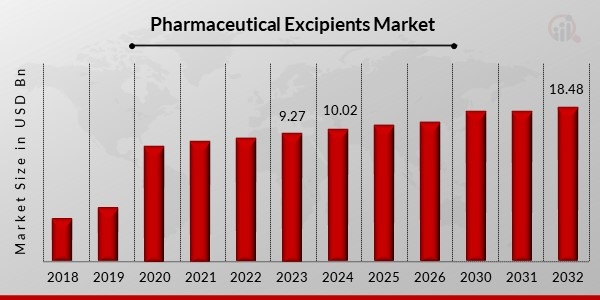Pharmaceutical Excipients Market Overview
The pharmaceutical excipients market has experienced substantial growth over recent years, driven by the increasing demand for advanced drug formulations, rising global healthcare expenditure, and the growing trend of personalized medicine. Excipients are essential components of pharmaceutical formulations, serving as inactive substances that aid in the stability, efficacy, and delivery of the active pharmaceutical ingredients (APIs). These substances include binders, fillers, stabilizers, preservatives, and flavoring agents, among others. Excipients are crucial in the development of tablets, capsules, injectable formulations, and topical products, ensuring optimal performance and patient compliance.
In the current landscape, the pharmaceutical excipients market is witnessing rapid growth, owing to the continuous advancements in drug delivery systems, the growing focus on improving the bioavailability of poorly soluble drugs, and the increasing demand for multifunctional excipients. With innovations in excipient technologies, the market is anticipated to expand further, providing a broad range of opportunities for pharmaceutical companies and excipient manufacturers alike.
Key Companies
Evonik Industries Ag,
Basf Se,
Ferro Corporation,
P&G Chemicals,
Akzo Nobel NV,
FMC Corporation,
The Dow Chemical Company,
Ashland, Inc.,
Croda International PLC), among others
Download Sample Pages –
https://www.marketresearchfuture.com/sample_request/868
Key Trends in the Pharmaceutical Excipients Market
Rise of Biologics and Biosimilars: The increasing number of biologic and biosimilar drugs entering the market has a significant impact on the excipients market. Biologics, such as monoclonal antibodies, often require specialized excipients for effective formulation, which has led to an increased demand for excipients that can support the unique needs of these drugs, including stabilizers and preservatives.
Personalized Medicine: The shift toward personalized medicine is revolutionizing drug formulation and, in turn, the excipients market. Personalized treatments require more precise formulations, leading to the development of novel excipients tailored to specific patient needs, such as those with rare diseases or unique genetic profiles.
Growing Focus on Functional Excipients: There is a growing demand for multifunctional excipients that not only provide the traditional role of aiding drug stability but also contribute to the drug’s release profile or bioavailability. This is particularly important in the development of novel drug delivery systems, such as sustained-release, controlled-release, and targeted-release formulations.
Natural and Green Excipients: With growing concerns over the environmental and health impacts of synthetic excipients, there has been a rising demand for natural and sustainable excipients. Manufacturers are increasingly turning to plant-based and biodegradable excipients, aligning with the broader trend toward green chemistry and sustainable pharmaceutical manufacturing.
Regulatory Advancements: Regulatory agencies, including the FDA and EMA, are focusing on the safety and quality of excipients used in drug formulations. This has led to stringent regulatory guidelines for the approval and use of excipients in pharmaceutical products, influencing their development and manufacturing processes.
Industry Growth Drivers:
Expanding Pharmaceutical Industry: The growing pharmaceutical industry, fueled by an aging global population, an increase in chronic diseases, and the rising demand for innovative treatments, is a significant driver for the excipients market. New drug formulations require excipients that can enhance the stability, solubility, and bioavailability of APIs.
Advancements in Drug Delivery Systems: The demand for advanced drug delivery systems, such as transdermal patches, oral controlled-release tablets, and injectable formulations, requires novel excipients to optimize these technologies. As drug delivery systems become more sophisticated, excipients that can aid in achieving specific release profiles are in high demand.
Increasing Generic Drug Production: The surge in the production of generic drugs, which often require specific excipients for their formulations, is further driving market growth. The increased availability of affordable generics is boosting the demand for excipients as pharmaceutical companies aim to replicate the original brand formulations efficiently.
Buy now: https://www.marketresearchfuture.com/checkout?currency=one_user-USD&report_id=868
Market Restraints:
Regulatory Hurdles: The regulatory landscape for pharmaceutical excipients is becoming more stringent, with the need for thorough testing and certification of excipient quality. This can be a significant barrier for small and mid-sized companies looking to enter the market or innovate in excipient formulations.
Complexity in Formulation: The development of new excipients with specific functionalities often requires a high degree of expertise and significant investment in research and development (R&D). The complexity involved in formulating drugs with the right excipients for specific delivery systems can also create challenges for manufacturers, particularly in terms of cost-effectiveness and time-to-market.
Market Opportunities:
Emerging Markets: Rapid economic growth in emerging markets such as Asia-Pacific and Latin America is creating opportunities for pharmaceutical excipient manufacturers. As healthcare infrastructure improves and access to medication increases in these regions, the demand for excipients to support the growth of pharmaceutical products is expected to rise.
Technological Advancements: The development of new excipient technologies, such as the use of nanomaterials and nanotechnology in drug delivery systems, presents significant opportunities for growth. These innovations can offer enhanced drug delivery, better stability, and improved patient outcomes, all of which require specialized excipients.
Business Threats:
Pricing Pressure: Increased competition in the excipients market, especially with the rise of generic excipients, can put downward pressure on prices. Pharmaceutical companies are increasingly looking to minimize costs, which may impact the margins for excipient manufacturers.
Supply Chain Disruptions: The global supply chain for excipients can be affected by various factors, including geopolitical tensions, raw material shortages, and transportation disruptions. Such events can cause delays in production and delivery, which can affect the overall market stability.
Related Report –
Optical Imaging Market: https://www.marketresearchfuture.com/reports/optical-imaging-market-6172
Kidney Function Test Market: https://www.marketresearchfuture.com/reports/kidney-function-test-market-6171
Media Contact
Company Name: Market Research Future
Contact Person: Media Relations
Email: Send Email
Country: United States
Website: https://www.marketresearchfuture.com

